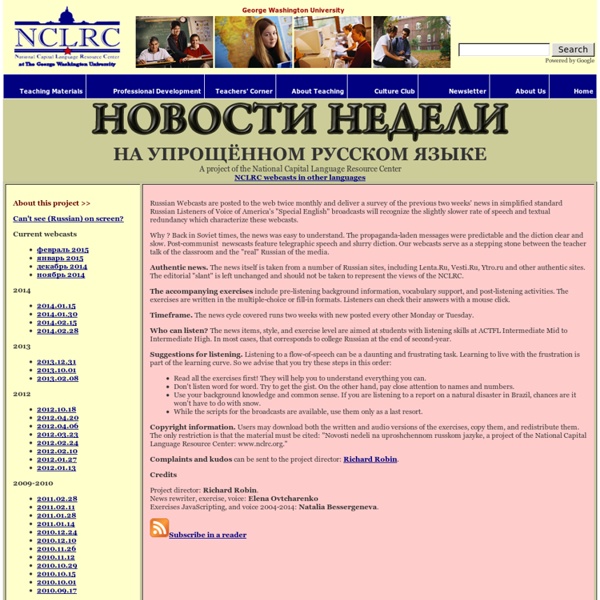Russian Webcasts
Russian Webcasts are posted to the web twice monthly and deliver a survey of the previous two weeks' news in simplified standard Russian Listeners of Voice of America's "Special English" broadcasts will recognize the slightly slower rate of speech and textual redundancy which characterize these webcasts. Why ? Back in Soviet times, the news was easy to understand. The propaganda-laden messages were predictable and the diction clear and slow. Post-communist newscasts feature telegraphic speech and slurry diction. Authentic news. The accompanying exercises include pre-listening background information, vocabulary support, and post-listening activities. Timeframe. Who can listen? Suggestions for listening. Read all the exercises first! Copyright information. Complaints and kudos can be sent to the project director: Richard Robin. Credits Project director: Richard Robin.
10 best free Russian learning resources
I think it’s wise to invest into your education, and language learning in particular. You might have to give up a few beers or coffees every month, but that one good book, app, or online resource may easily make the difference in how fast you progress. That doesn’t mean that there is no high quality material for Russian learners that is free, but it certainly takes quite some time to find it, and to use it properly. To save you time, I’ve decided to share some of my favourite free resources below: RT Learn Russian An interactive language learning website from the news site Russia Today. Anki Anki uses the so-called spaced repetition system to predict when you are about to forget new words that you're learning, and remind you just before your memory fades completely. Memrise Memrise is an online spaced repetition vocabulary learning website. Lang-8 The golden grail of writing practice. dic.academic Readlang lib.rusek Forvo Not quite sure how to pronounce the city of Blagoveshchensk? Gramota
Learn Russian for Free - Russian language lessons, texts & more
About Project
Транслит по-русски
Learn Russian Language - Beginning to Advanced Russian
Related:
Related:



